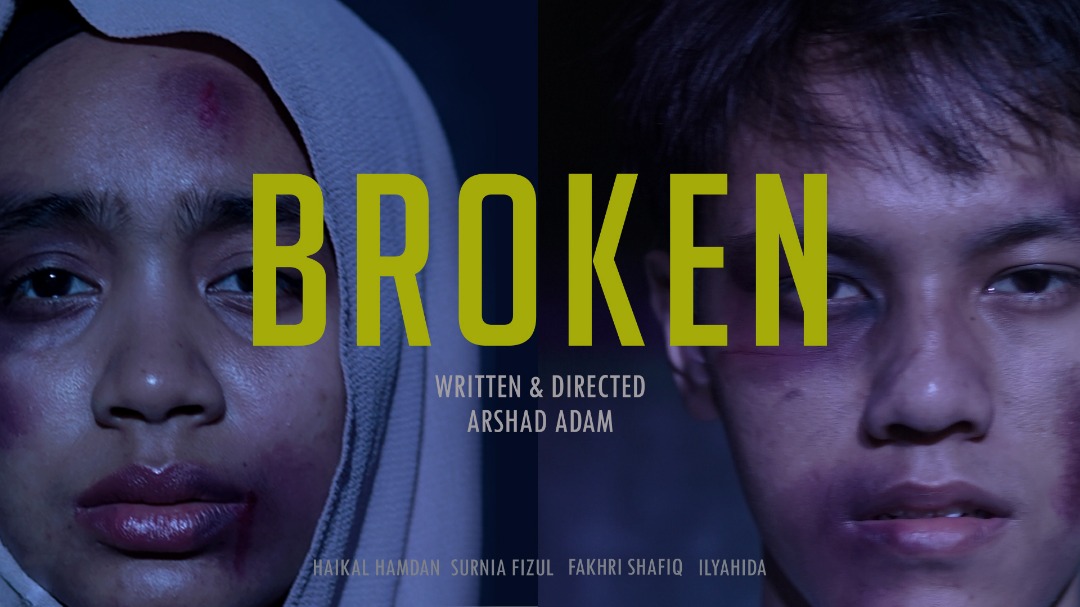“Broken manifested from an idea, that everyone’s soul is incomplete, in some part of our life and coincidentally, there were many news / stories about women being oppressed and abused in our country and heated discourses that favoured men that tie with religion and culture. I think the feminist in me was so enraged that I feel the need to voice out my opinion, and it translated in Broken.” — Arshad Adam, playwright
WHEN Broken was staged in 2017, it touched many for its realistic portrayal of domestic abuse, and its effect on the people at home.
The 90-minute play depicts the roles of women in marriage and the concept of an ideal marriage, states the festival notes. It dives deep into the ebbs and flows of family institutions and marriage by exploring the issues of divorce, custody and alimony.
Broken was restaged for the George Town Festival 2018, under Sisters of Islam’s Project Batu Lesung banner, as part of GTF’s Week on Women. Arshad says: ” It’s with a different cast, a different direction, a revised script. It has a different look.
“I try to treat this as staging it for the first time. It was staged last year to which, at that time, I didn’t explore my role as a director to its potential.
“Being a writer and director, sometimes you find yourself being stuck in the shoes of a writer than a director, that’s what happened to me last year.
“Although it received rave reviews, the director side of me wasn’t satisfied. For George Town Festival, it challenges me as the director and man, I am having fun with it.”
Arshad is part of indie Malay theatre group Revolution Stage, now into its 12th year. It was set up for performing arts students to organise shows especially stage performances outside of their universities/colleges. Soon, performing arts students from Aswara, UiTM, UM, USM and others joined. I remember its fascinating small shows at Dewan Bahasa Dan Pustaka’s The Stor. It offered an intimate setting, with the plays done in different Malay dialects. Nam Ron, Ayam Fared and Khairunazwan Rodzy were part of the core group members.
Says Arshad: “I started with Revolution Stage (RS) by joining a six-month theater workshop and upon completion, volunteered to do managerial side of RS while at the same time freelancing.
“I always wanted to write and have been writing in my university days. My years with RS opens up possibilities in theatre.
“In early 2015, I left RS to focus on my personal development as a writer and director. I was a literature minor student back in university — after graduating and working at a bank for six months, I found myself lost within the 9-to-5 routine and adulthood!
“I was demotivated and started questioning my existence. I was stuck facing an endless existential crisis and theatre saved me.”
On writing the play, Broken, he says: “I like to experiment and challenge myself as a writer and in telling stories. I love drama, it’s a part of everyone’s life. And people who know Arshad Adam know that I love stories that trigger people.
“I’ve written stories about autism, LGBT, suicide, depression, etc ; topics that many find to be taboo.
“Broken manifested from an idea, that everyone’s soul is incomplete, in some part of our life and coincidentally, there were many news / stories about women being oppressed and abused in our country and heated discourses that favoured men that tie with religion and culture.
“I think the feminist in me was so enraged that I feel the need to voice out my opinion, and it translated in Broken.”
The play is part of the two-day Project Batu Lesung, focusing on issues taken up by Sisters in Islam’s advocacy i.e. the concept of marriage as a partnership of equals and addressing the issue of gender equality.
A typical Malaysian family would have a “batu lesung” (or pestle and mortar) in the kitchen, making this the one kitchen tool which binds us. As the batu lesung knocks stones together, pounding and turning the mix of seeds, grains and spices into a single delicious paste, characters and traits also starts to meld together, seasoned by hard knocks. The blend then turns into a single family unit.
The other event in the project is the film screening of Diary for Prasana (Aug 11) at Scoopoint. The Norhayati Kaprawi’s documentary presents to the audience a glimpse into the life of Indira Gandhi, a Hindu woman. Upon her divorce, her ex-husband took their daughter, Prasana, away from Indira and converted her to Islam. Indira has been separated from her daughter for the past eight years. The documentary highlights the impact of unilateral conversion onto family members, individuals and society at large; and leads up to a ferocious battle against the country’s dual legal system.
For info and the festival programme, visit www.georgetownfestival.com.
** This article appeared in the new straits times.


